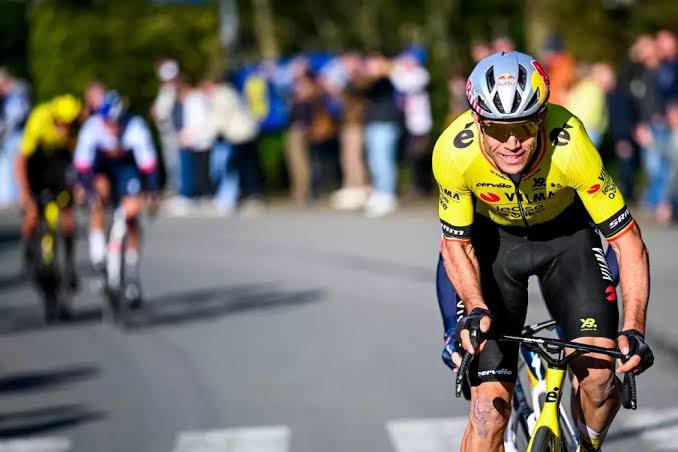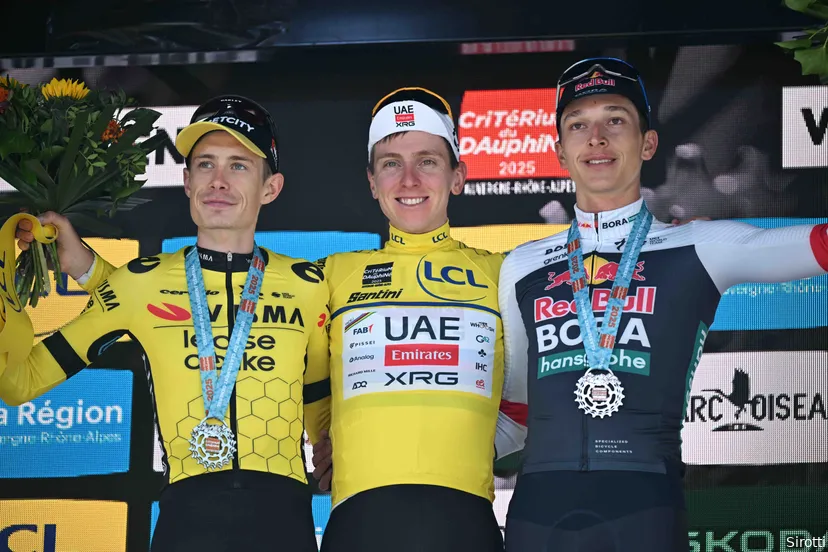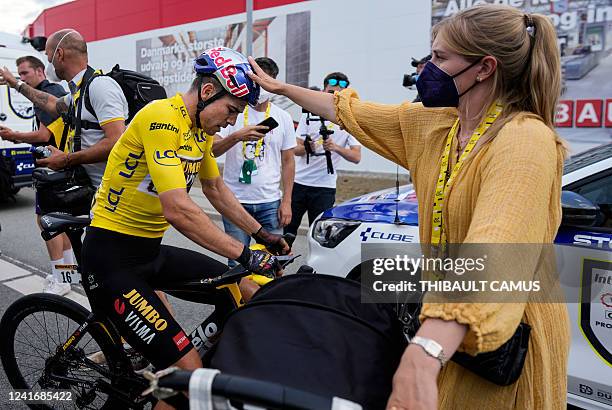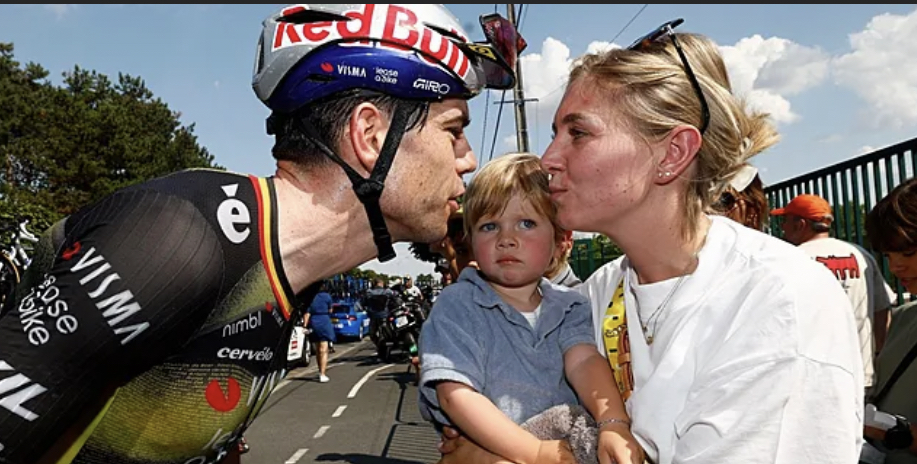**Wout van Aert’s Acknowledgment: Accepting the Challenge of Matching Mathieu van der Poel’s Legacy**
In the world of professional cycling, few rivalries have captured the imagination of fans and pundits quite like that of Wout van Aert and Mathieu van der Poel. Both riders, hailing from Belgium and the Netherlands respectively, have become household names through their exceptional performances across a variety of disciplines—cyclocross, road racing, and mountain biking. Their chemistry, rivalry, and mutual respect have elevated the sport’s profile, making every encounter between them a highly anticipated event.
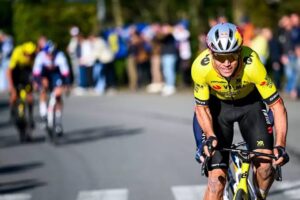
Recently, Wout van Aert made a poignant and candid statement that resonated deeply within the cycling community: he publicly acknowledged that he has come to terms with the reality that he cannot match Mathieu van der Poel’s unique combination of talent, versatility, and charisma. This admission, rather than being a sign of weakness, reflects a mature understanding of his own limits and a respectful recognition of van der Poel’s extraordinary abilities.
The Rise of Wout van Aert
Wout van Aert’s journey to the top ranks of cycling has been marked by relentless dedication and an impressive array of victories. Born in 1994 in Belgium, Van Aert quickly established himself as a prodigious talent in cyclocross, winning multiple national and world championships. His muscular physique, combined with incredible technical skill and tactical intelligence, allowed him to dominate in muddy, technical conditions that often favor specialists.
Transitioning seamlessly to road racing, Van Aert’s versatility became his hallmark. From sprint finishes to mountain climbs, he proved capable of competing at the highest level in a variety of terrains. Notable victories include stages in the Tour de France, classics like Milan-San Remo, and one-day races such as Strade Bianche. His ability to excel across disciplines has earned him a reputation as one of the most complete cyclists of his generation.
The Ascendancy of Mathieu van der Poel
Mathieu van der Poel, born in 1995 in the Netherlands, similarly distinguished himself early on, initially through his success in cyclocross. His aggressive riding style, combined with innate talent, led to multiple world championships and national titles. Like Van Aert, van der Poel’s crossover to road racing was marked by immediate impact, including victory in the Amstel Gold Race and stages in Grand Tours.
What sets van der Poel apart, however, is his extraordinary power and flair. His ability to accelerate out of seemingly impossible situations, combined with a charismatic personality that endears him to fans, has made him a beloved figure in cycling. His affinity for attacking races and his unrelenting pursuit of victory have cemented his status as one of the sport’s most exciting riders.
The Rivalry and Its Impact
The Van Aert-van der Poel rivalry has been a defining feature of modern cycling. Their encounters across cyclocross, one-day classics, and stage races have often been dramatic and fiercely contested. Fans have relished in their battles, which showcase contrasting styles: Van Aert’s tactical patience and resilience versus van der Poel’s aggressive, attack-oriented approach.
This rivalry has fueled a broader narrative about Belgian versus Dutch cycling, regional pride, and the quest for supremacy in the sport. Media coverage, social media debates, and fan chants have turned their duels into must-watch events, elevating the sport’s popularity.
Wout van Aert’s Reflection and Acceptance
Amidst this backdrop, Wout van Aert’s recent message to fans marks a significant moment of introspection and humility. He openly acknowledged that, despite his extraordinary talents and achievements, he has come to accept that he cannot replicate or surpass Mathieu van der Poel’s unique combination of skills and charisma.
In a heartfelt interview, Van Aert stated, “I’ve always been competitive, and I’ve always pushed myself to be the best. But I’ve also realized that Mathieu has something special—an innate ability to perform at the highest level across multiple disciplines with a kind of flair that’s hard to match. I respect that deeply, and I’ve accepted that I might not be able to reach that same level of versatility or charisma. My goal now is to focus on what I can control and continue to give my best in the races I love.”
This statement has been interpreted by many as a sign of growth—an athlete who recognizes his own boundaries and chooses to embrace them rather than constantly compare himself to a peer he admires and respects. It’s a message that resonates with fans who appreciate honesty, humility, and a focus on personal excellence.
The Significance of the Message
Van Aert’s acknowledgment is significant on multiple levels:
1. **Maturity and Self-Awareness:** It demonstrates his emotional intelligence and maturity, qualities that are vital for longevity in a demanding sport. Recognizing one’s limits allows for healthier mental approaches and reduces unnecessary pressure.
2. **Respect for a Rival:** His words reflect genuine respect for van der Poel’s exceptional abilities. In a competitive environment that often breeds rivalry and tension, such humility fosters sportsmanship and mutual respect.
3. **Focus on Personal Goals:** By accepting that he cannot match van der Poel’s multifaceted genius, Van Aert can now channel his efforts into areas where he can excel, such as stage racing, sprint finishes, or specific classics, without the burden of comparison.
4. **Inspiration to Fans:** His message serves as an example for fans and aspiring athletes—that understanding and embracing one’s strengths and weaknesses is a path to sustained success and happiness.
The Broader Implications for Cycling
Wout van Aert’s candid admission reflects broader themes within professional sports: the importance of self-awareness, humility, and respect for competitors. It challenges the often-pervasive narrative that athletes must constantly chase perfection or outdo rivals at all costs.
Furthermore, it underscores the idea that greatness can take many forms. While Mathieu van der Poel’s versatility and charisma are exceptional, Van Aert’s own strengths—such as his tactical intelligence, resilience, and consistency—continue to make him a formidable competitor and a fan favorite.
Moving Forward: Celebrating Diversity of Talent
The cycling community stands to benefit from this honest acknowledgment. It reminds fans that sports are not solely about surpassing others but about personal growth, respecting diverse talents, and enjoying the unique qualities each athlete brings to the sport.
Both Van Aert and van der Poel will undoubtedly continue to push each other, inspiring new generations of cyclists. Van Aert’s message encourages a healthy perspective: appreciating rivals not just for their victories but for their unique contributions to the sport.
Wout van Aert’s acceptance that he cannot match Mathieu van der Poel’s multifaceted genius marks a mature and admirable chapter in his career. It exemplifies humility, self-awareness, and respect—values that elevate not only athletes but also the sport of cycling itself. As fans, we are fortunate to witness these athletes’ journeys, understanding that greatness manifests in many forms, and true sportsmanship lies in acknowledging and celebrating those differences. Moving forward, both Van Aert and van der Poel will continue to inspire with their performances, reminding us that the pursuit of excellence is a personal journey—one that is richer when marked by respect, humility, and passion.
